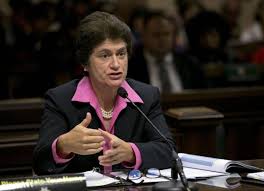Earlier this month, an international television news network aired a 25-minute report that focuses on a 184-bed nursing home owned by Brius CEO Shlomo Rechnitz. The news story — entitled “‘Where people come to wait to die’: COVID-19 in US nursing homes” — aired on Al Jazeera’s “Fault Lines” program on December 2 and is available at the link above.
The report focuses on Kingston Healthcare Center in Bakersfield, California. As of early December, 104 residents at the facility had contracted COVID-19 and 19 residents had died. The California Department of Public Health reports that at least 87 staff at the facility have also contracted the coronavirus.
In interviews, Kingston caregivers describe a variety of care failures.
“Christina DeWoody worked at Kingston as a cleaner until a few months ago. Before supervisors provided personal protective equipment (PPE) she and other workers would use brown paper bags, the kind schoolchildren use for their lunches, and tie them around their noses and mouths as makeshift barriers.
‘Their quality of care was pretty much none,’ DeWoody recalled, remembering elderly patients lying for hours without access to water, suffering from a combination of COVID-19 and dehydration. She described others sitting in their urine and faeces [sic], with no one to change them – potentially leading to deadly sepsis, a common condition in nursing homes when patients become infected from their own excrement. As workers stopped showing up, patients would cling to DeWoody’s arm, begging her not to abandon them. She cried on her drive home every day.”
According to public records, Brius’s Shlomo Rechnitz owns the nursing home and leases it to Dr. David Silver, who serves as the CEO of Rockport Healthcare Services. Rockport, which operates all of Brius’s nursing homes, was recently cited by state regulators for illegally evicting low-paying residents in order to replace them with higher-paying ones.
Reporters also interviewed the family member of a resident who died of alleged care failures at a second Brius nursing home, Country Villa Westwood in Los Angeles.
Dr. Michael Wasserman, the former CEO of Rockport, tells Al Jazeera he recently left Rockport when “he found some of the practices there untenable.” Dr. Wasserman states: “I was told that I would be running the company. The long and the short was: that wasn’t true.”
The investigative report also probes into the apparent failures of state officials to protect nursing home residents. For example, the California Department of Public Health has allowed the Kingston facility to operate without a regular license for at least three years. Meanwhile, the facility has racked up dozens of complaints and violations as well as fines and sanctions for substandard care. Thus far in 2020, patients and their families “have filed 192 formal complaints against it, compared with the state average of 21,” says Al Jazeera.
The Kingston facility has been cited for four times more care violations than the average US nursing home. For more than two years, the nursing home has appeared on the federal Centers for Medicare & Medicaid Services’ (CMS) short list of the nation’s poorest-performing facilities, showing no signs of improvement in that time. The facility is currently facing a $92,500 fine as a result of numerous violations detailed in a citation report issued by Cal/OSHA in October.
Molly Davies, a Long-Term Care Ombudsman for the City and County of Los Angeles County, says: “What we’ve seen is that the regulatory enforcement system favors the industry above consumers. And that is precisely the opposite of what it is designed to do.”
The Al Jazeera report includes interviews with multiple Kingston caregivers, family members of nursing home residents, Tony Chicotel (an attorney with the California Advocates for Nursing Home Reform), Matt Feuer (Los Angeles City Attorney), two private attorneys who are suing Brius on behalf of residents and family members, and a researcher from the National Union of Healthcare Workers.





